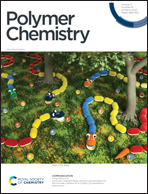Tuning thermal properties of cross-linked DCPD polymers by functionalization, initiator type and curing methods†
Abstract
ROMP derived poly-dicyclopentadiene (poly-DCPD) is a relatively new engineering material with high impact resistance, high chemical corrosion resistance and high deflection temperature. The great functional group tolerance of ruthenium initiators also allows the formation of novel polymers derived from functionalized dicyclopentadiene derivatives with varying material properties. However, these materials have not been thoroughly studied to date. Therefore, systematically studying the mechanical properties of the produced polymers by changing several parameters, such as initiator type and loading, monomer/s chemical structure and the use of heat or light based curing methods is of great interest. Herein, we report the synthesis of different sets of polymer and co-polymer films based on DCPD derivatives produced by three different Ruthenium-based initiators under thermal or photochemical activation conditions. The thermal and mechanical properties of these films were examined by dynamic mechanical analysis (DMA). Indeed, the various reaction conditions used to make the films and the nature of substituents significantly influenced the mechanical properties of the resulting polymeric films and pave the way for the discovery of polymeric materials with enhanced physical and chemical properties.



 Please wait while we load your content...
Please wait while we load your content...